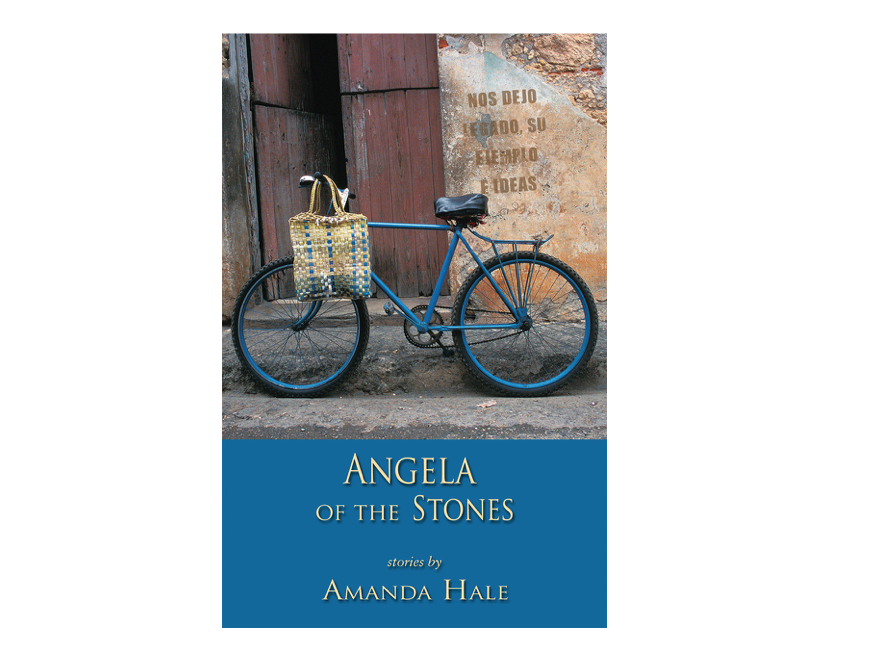
Angela of the Stones
Amanda Hale
Thistledown Press Ltd., 2018
Review by Katharine Beeman
In her recent column for Juventud Rebelde, renowned Cuban intellectual Graziella Pogolotti wrote that “authentic art constitutes a specific way of knowing the most profound zones of reality.” Amanda Hale’s short story collection Angela of the Stones, which contains linked short stories about the human ecosystem of Cuba, and specifically Baracoa, is this kind of art.
We step into Cuban living rooms, bedrooms, kitchens, onto rooftops, walk through the park and along the Baracoa waterfront.
“It is six o’clock in the evening, the hour on the equator when the trees are alive with birds and the streets are crowded with a quick bustling of tired people unwinding after a long day, hurrying home, stopping only to buy bread or vegetables for the evening meal, crowding the doorways of stores for one last look before they close….”
These are short stories, but to get the full richness they should be read consecutively. After a few stories, you’re deep into the world of the characters. You care about these people, gasp oh no when you learn why Angela is of the stones, (it wouldn’t be fair to tell before you read it) and sigh with relief when it is revealed that Yanelis is not indeed pregnant by her Greek boyfriend.
Hale packs many subtle truths into her sentences, her prose exposing the flavours of Cuba’s deep reality: a place that is alive with love and magic but where life is not easy. We have the young spirit of the old, age gaps among couples, the old still dancing, the immense and wordless tenderness:
“Inside his mottled skin lives yet that young man, his hand, now twisted with arthritis, resting on his bride’s shoulder, claiming her. Erminda is more than a decade younger and can still dance circles around him, then she will stop suddenly and lay her head on his chest in a gesture beyond words.”
And we have the hard-felt problems of scarcity and regionalism: “It was a struggle with so little medicine available in Baracoa, always el ultimo… far from the nation’s capital which, even though it was situated at the tail of the alligator which is Cuba, managed to gobble up all of the resources.”
Not a billboard of bright colours, this is a book of tonalities of the human landscape and ways of living in it—the homeland that is humanity, to paraphrase Jose Martí, Cuba’s National Poet. This is something many visitors don’t see maybe because like long-term visitor Ronald, they never bother to learn the language, the bitter-sweetness, the fine sense of ironic humour that most Cubans live with. And how not to be bitter-sweet, living in an existing, genuinely-intended socialist state, without the means, in large part because of the U.S. blockade, to make it fully so?
After her initial introduction to Cuba as a muralist and visual artist, Hale enjoyed extended and frequent contact with Cuba throughout the past 15 years. As a result, the book feels meticulously lived and observed, full of fine-tuned detail: “The red slices glistened with oil and salt, wafer-thin slices of transparent white onion nestled on top and a bent fork balanced on the edge of the plate.”
While Hale’s dialogue captures in English how Cuban is spoken—no mean feat—she also remains in Canadian skin, seeing as Karina does in “The Unwelcome Guest” (who may or may not be Karina): “She knew that as a foreigner she didn’t count.” She also gets other Canadians dead to rights: “…fat, beefy looking fellows of a certain age….”
My favourite story, Another World, is near the end. I want more of Sonia, who “already had years of experience coaching her own girls in Cuban history and literature, trying to instill in them the values embedded in the words of Jose Martí.” Her teenage, cellular-wise daughters are a treat, as is her daughter’s boyfriend’s grandma who “enters the house like a beauty queen, in a pair of skin-tight red pants, platform heels, and a revealing white top glistening with gold sparkles. She is proud of her body, even as her well suckled breasts succumb to gravity and her voluptuous curves expand into the salvavidas bulging under her tight sparkly top.” This story is symbolic of Cuba’s many other worlds, different from the Canadian one, from each other, jostling, co-existing, working out that ‘another world’ of the future.
This is a book whose power creeps up on you like el caiman, the alligator. Angela of the Stones is an essential book in that Hale portrays the essences, flavours, sabores, of Cuba’s multi-faceted, sometimes contradictory realities. Living in Cuba, I have met and heard Amanda Hale’s people. It’s a worthy and eye-opening conversation, a must-read, for both those who are new to Cuba and those already in solidarity. It defends not only what many visitors see as “paradise”, but does so while being conscious of “the complexities that sit better on a foundation of intimacy.”
Katharine Beeman is a Montreal poet, translator, and contributing editor for the Canada Cuba Literary Alliance.Her work includes several bilingual English-Spanish books of poetry with Cuban themes: A swamp and forest inlander meets the sea, Kasus Books, Montreal, 2009/Alguien de tierra adentro, del pantano y delbosque, conoce el mar, Colección Sur, La Habana, 2016; Cuban secrets, Secretos cubanos, Sand Crab Books, Ontario, 2011; As in homages,Como en homenajes, Kasus Books, Montreal, 2014 and inclusion in over12 anthologies. She’s currently working on a French edition of selectedpoems going back to 1993, tentatively called Le Livre de l’Eau. She first went to Cuba on an archeological expedition in 1998 and divides her time between Montreal and Holguín, Cuba, where she lives with her Cuban husband.